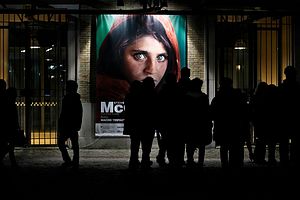Sharbat Gula, the famed “Afghan Girl” depicted on the cover of National Geographic in 1985, will be deported back to Afghanistan after being imprisoned for 15 days in Pakistan.
Gula was found guilty of living in Pakistan using fraudulent identity documents, accusations she has denied. She is one of thousands of Afghan refugees accused of acquiring fake ID cards. A special court has ruled that Gula will leave Pakistan by Monday under Section 14 of the Foreigners Act 1946.
“With utmost delight, I announce that Sharbat Gula is now free from the legal troubles she endured over the past couple of weeks,” Omar Zakhilwal, Afghanistan’s ambassador to Pakistan, wrote on his Facebook page following the court’s verdict.
“She soon will also be free from an uncertain life of a refugee as she will be on her way back to her own country as soon as next Monday where she still is a beloved image and a national icon.”
Afghanistan President Ashraf Ghani will meet her when she reaches the country.
Gula, whose striking green eyes made her well-known worldwide, escaped Soviet-occupied Afghanistan when she was a teenager. On October 23, she was arrested in Peshawar, near the Afghan border, after a two-year investigation.
Last week, a local court rejected Gula’s bail request. Special Court for Anti-Corruption and Immigration Judge Farah Jamshed rejected her bail, ruling that the defense attorney highlighted human rights and did not cover any legal arguments.
“During her illegal stay in Pakistan, she twice misused her position by obtaining a Computerized National Identity Card,” the judge held.
Gula appeared on National Geographic’s cover in 1985 in an image taken by photographer Steve McCurry in a Pakistan refugee camp during the Soviet occupation of Afghanistan. Her striking green eyes made the photograph the magazine’s most famous cover.
McCurry searched for her again 17 years later when she was living in the Tora Bora region of Afghanistan. Gula eventually returned to Pakistan and he has been in touch with her since then. McCurry recently said he had sourced a lawyer for Gula after her arrest.
The court sentenced Gula to 15 days of jail time and 110,000 rupees ($1,100) fine after she pleaded guilty to the charges, her lawyer told BBC Urdu.
An Afghan consulate officer confirmed that Gula has paid the fine.
“We… will take her to Afghanistan in an honorable way on Monday,” Abdul Hameed Jalili, counselor for refugees at the Afghan consulate in Peshawar, was quoted as saying by AFP. Gula’s children will return with her to Afghanistan.
Amnesty International has criticized the deportation, calling it a “grave injustice.”
“For decades, she was known as the world’s most famous refugee and seen as a symbol of Pakistan’s status as a generous host,” said Champa Patel, Amnesty International’s South Asia Director.
“Now, by sending her back to a country she hasn’t seen in a generation and her children have never known, her plight has become emblematic of Pakistan’s cruel treatment of Afghan refugees.”
However legal experts have argued that Gula received a light sentence, as she could have been imprisoned for years.
Pakistan has provided asylum for millions of Afghan refugees, from those who escaped their country during the Soviet occupation of Afghanistan, like Gula, to more recent escapees of the 15-year war against the Taliban. But since July, Pakistan has launched a new crackdown on refugees, seeking to repatriate them to Afghanistan.
UNHCR, the refugee arm of the United Nations, said over 350,000 Afghan refugees (both documented and undocumented) have been repatriated from Pakistan this year. The agency expects another 450,000 to be returned to Afghanistan. The crackdown comes amid worsening relations with Pakistan’s neighbors India and Afghanistan.
Roshni Kapur is a graduate student at the University of Sydney majoring in Peace and Conflict Studies.

































